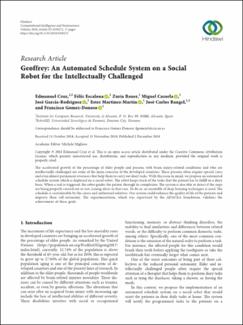| dc.contributor.author | Rangel, José Carlos | |
| dc.contributor.author | Cruz, Edmanuel | |
| dc.contributor.author | Escalona, Félix | |
| dc.contributor.author | Bauer, Zuria | |
| dc.contributor.author | Cazorla, Miguel | |
| dc.contributor.author | García Rodríguez, José | |
| dc.contributor.author | Martinez Martin, Ester | |
| dc.contributor.author | Gomez Donoso, Francisco | |
| dc.date.accessioned | 2020-01-02T20:09:44Z | |
| dc.date.accessioned | 2020-01-02T20:09:44Z | |
| dc.date.available | 2020-01-02T20:09:44Z | |
| dc.date.available | 2020-01-02T20:09:44Z | |
| dc.date.issued | 12/02/2018 | |
| dc.date.issued | 12/02/2018 | |
| dc.identifier | https://www.hindawi.com/journals/cin/2018/4350272/ | |
| dc.identifier.uri | https://ridda2.utp.ac.pa/handle/123456789/9443 | |
| dc.identifier.uri | https://ridda2.utp.ac.pa/handle/123456789/9443 | |
| dc.description | The accelerated growth of the percentage of elder people and persons with brain injury-related conditions and who are intellectually challenged are some of the main concerns of the developed countries. These persons often require special cares and even almost permanent overseers that help them to carry out diary tasks. With this issue in mind, we propose an automated schedule system which is deployed on a social robot. The robot keeps track of the tasks that the patient has to fulfill in a diary basis. When a task is triggered, the robot guides the patient through its completion. The system is also able to detect if the steps are being properly carried out or not, issuing alerts in that case. To do so, an ensemble of deep learning techniques is used. The schedule is customizable by the carers and authorized relatives. Our system could enhance the quality of life of the patients and improve their self-autonomy. The experimentation, which was supervised by the ADACEA foundation, validates the achievement of these goals | en_US |
| dc.description.abstract | The accelerated growth of the percentage of elder people and persons with brain injury-related conditions and who are intellectually challenged are some of the main concerns of the developed countries. These persons often require special cares and even almost permanent overseers that help them to carry out diary tasks. With this issue in mind, we propose an automated schedule system which is deployed on a social robot. The robot keeps track of the tasks that the patient has to fulfill in a diary basis. When a task is triggered, the robot guides the patient through its completion. The system is also able to detect if the steps are being properly carried out or not, issuing alerts in that case. To do so, an ensemble of deep learning techniques is used. The schedule is customizable by the carers and authorized relatives. Our system could enhance the quality of life of the patients and improve their self-autonomy. The experimentation, which was supervised by the ADACEA foundation, validates the achievement of these goals | en_US |
| dc.format | application/pdf | |
| dc.format | text/html | |
| dc.language | eng | |
| dc.language.iso | en | en_US |
| dc.rights | https://creativecommons.org/licenses/by-nc-sa/4.0/ | |
| dc.rights | info:eu-repo/semantics/openAccess | |
| dc.subject | Research Subject Categories::TECHNOLOGY | en_US |
| dc.subject | Research Subject Categories | |
| dc.title | Geoffrey: An Automated Schedule System on a Social Robot for the Intellectually Challenged | en_US |
| dc.type | info:eu-repo/semantics/article | |
| dc.type | info:eu-repo/semantics/publishedVersion | |
